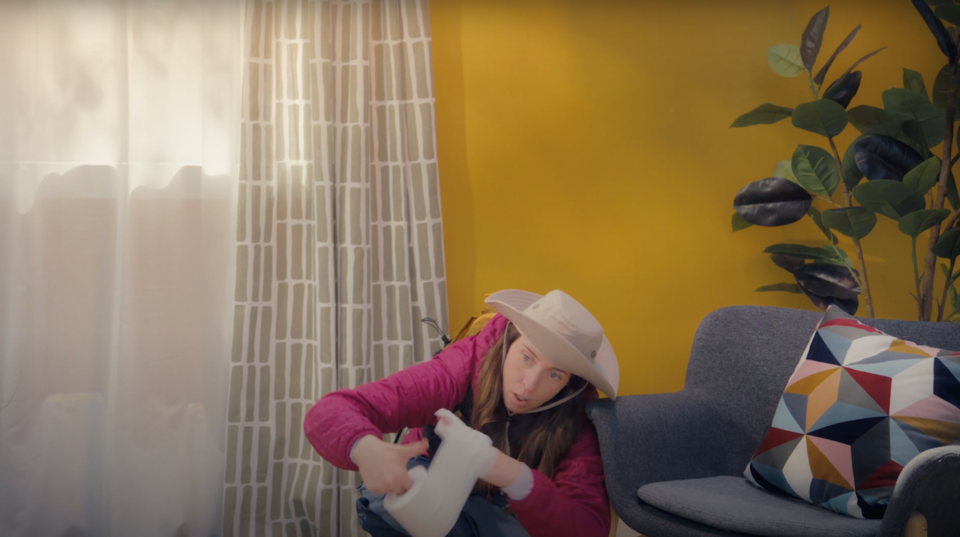Working in community news can feel a bit like a Groundhog Day scenario after a stretch.
Year after year, the months roll by promising the same events, the same quarterly milestones, like clockwork.
Finding a fresh and engaging spin on that annual community bake sale for the eighth year in a row (haven’t I written this headline before?) may come with the local journalism territory, and it’s actually part of the fun—but in recent years we’re seeing some newer, less whimsical recurrences added to the annual plot.
After all, how many times can you write about the risks of wildfire, or the importance of FireSmarting, before people just tune out?
And yet, as another May long weekend approaches, the imposing sense of déjà vu blanketing the valley, there are some messages that need to be repeated, ad infinitum.
Sometimes it helps to get creative to make sure people take notice.
The Don’t Love it to Death campaign, a product of B.C. tourism marketers and the provincial government launched in 2022, does just that with a new set of videos.
Short and snappy, the series of four recently-released clips starring comedian Katie Burrell focus on a hypothetical bad house guest (and possibly the worst): burning down your house, leaving a huge mess behind, not securing their garbage, and of course, pooping in the most inconsiderate of places.
“So you think you’re a good house guest, because you took a discreet dump at grandma’s house,” says the voiceover in that last one (yes, really).
“But you wouldn’t poop in her living room, so why do it on the side of a trail?”
Logic like that is just hard to argue with. Checkmate, trail-poopers.
Jokes aside, the brash approach does what it sets out to do—it grabs your attention, and manages to hold it long enough to deliver its (very important) messaging: Respect nature or just stay home.
According to the Don’t Love it to Death campaign, a new survey broadly targeting southwest British Columbia residents found the top three concerns are overcrowding, a lack of respect for nature, and garbage and human waste, with 68 per cent saying they regularly observed issues themselves in the outdoors.
The increase in users, and irresponsible users, is having a clear impact on our environment, according to stats provided by Don’t Love it to Death.
Since 2013, Divers for Cleaner Lakes and Oceans has pulled 28,404 kilograms of trash from B.C. lakes; more than 600 black bears were killed in 2023, an all-time high; search-and-rescue crews fielded 1,750 rescue calls involving lost or injured persons last year; and 42 per cent of wildfires were caused by humans, on average, in the last 10 years.
“While the impacts of bad behaviours in nature make news, corresponding solutions are at the heart of the Don’t Love It To Death campaign,” reads a release. “The campaign addresses hot-button issues: garbage and human waste, human-wildlife conflict, unsafe behaviour/lack of preparedness, lack of respect for people and the environment, trespassing and disrespectful use of the outdoors, and overcrowding, overuse, and traffic.”
In addition to the ad campaign, 158 Don’t Love it to Death signs will mark trailheads, parks and natural spaces throughout the region this summer, reminding people of their impact on the environment.
Aside from not pooping in your grandma’s sitting room, the campaign offers six helpful tips for the summer ahead: Practice fire safety by obeying fire prohibitions and using campfire best practices, and make sure to download the updated BC Wildfire Service app;
Follow the AdventureSmart Three Ts: Training, Trip Planning, and Taking the Essentials to reduce the severity and frequency of search-and-rescue calls;
Familiarize yourself with the 7 Principles of Leave No Trace, including properly disposing of human waste;
Keep wildlife wild, and remember you are in bear country. Ensure pets are on leash, give wildlife space, and don’t pet/feed animals;
Reduce your impact on overcrowding by visiting at off-peak times, exploring less busy areas, and planning ahead with public transit, parking, and permits;
And stop the spread of invasive plant species—one of the largest threats to biodiversity—by practicing the tenets of Play, Clean, Go. Clean your boots, gear, pets and vehicles of plant fragments, seed and mud before and after you play outside; and please stay on the trails.
Find more info and resources at dontloveittodeath.com.




